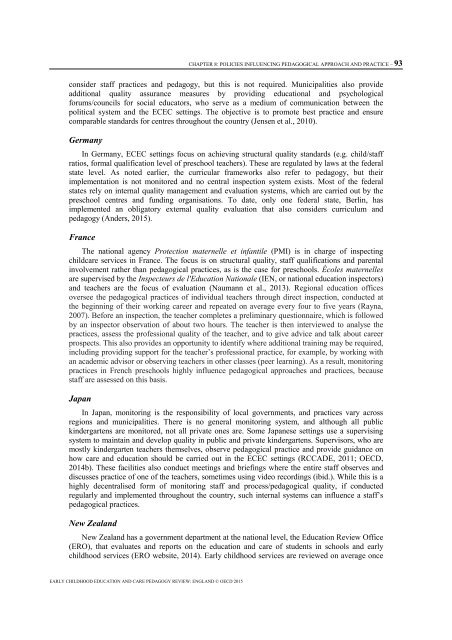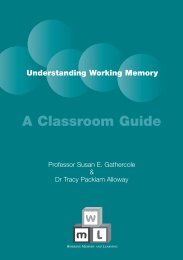early-childhood-education-and-care-pedagogy-review-england.pdf?utm_content=bufferb49b1&utm_medium=social&utm_source=twitter
early-childhood-education-and-care-pedagogy-review-england.pdf?utm_content=bufferb49b1&utm_medium=social&utm_source=twitter
early-childhood-education-and-care-pedagogy-review-england.pdf?utm_content=bufferb49b1&utm_medium=social&utm_source=twitter
You also want an ePaper? Increase the reach of your titles
YUMPU automatically turns print PDFs into web optimized ePapers that Google loves.
CHAPTER 8: POLICIES INFLUENCING PEDAGOGICAL APPROACH AND PRACTICE – 93consider staff practices <strong>and</strong> <strong>pedagogy</strong>, but this is not required. Municipalities also provideadditional quality assurance measures by providing <strong>education</strong>al <strong>and</strong> psychologicalforums/councils for social educators, who serve as a medium of communication between thepolitical system <strong>and</strong> the ECEC settings. The objective is to promote best practice <strong>and</strong> ensurecomparable st<strong>and</strong>ards for centres throughout the country (Jensen et al., 2010).GermanyIn Germany, ECEC settings focus on achieving structural quality st<strong>and</strong>ards (e.g. child/staffratios, formal qualification level of preschool teachers). These are regulated by laws at the federalstate level. As noted earlier, the curricular frameworks also refer to <strong>pedagogy</strong>, but theirimplementation is not monitored <strong>and</strong> no central inspection system exists. Most of the federalstates rely on internal quality management <strong>and</strong> evaluation systems, which are carried out by thepreschool centres <strong>and</strong> funding organisations. To date, only one federal state, Berlin, hasimplemented an obligatory external quality evaluation that also considers curriculum <strong>and</strong><strong>pedagogy</strong> (Anders, 2015).FranceThe national agency Protection maternelle et infantile (PMI) is in charge of inspectingchild<strong>care</strong> services in France. The focus is on structural quality, staff qualifications <strong>and</strong> parentalinvolvement rather than pedagogical practices, as is the case for preschools. Écoles maternellesare supervised by the Inspecteurs de l'Education Nationale (IEN, or national <strong>education</strong> inspectors)<strong>and</strong> teachers are the focus of evaluation (Naumann et al., 2013). Regional <strong>education</strong> officesoversee the pedagogical practices of individual teachers through direct inspection, conducted atthe beginning of their working <strong>care</strong>er <strong>and</strong> repeated on average every four to five years (Rayna,2007). Before an inspection, the teacher completes a preliminary questionnaire, which is followedby an inspector observation of about two hours. The teacher is then interviewed to analyse thepractices, assess the professional quality of the teacher, <strong>and</strong> to give advice <strong>and</strong> talk about <strong>care</strong>erprospects. This also provides an opportunity to identify where additional training may be required,including providing support for the teacher’s professional practice, for example, by working withan academic advisor or observing teachers in other classes (peer learning). As a result, monitoringpractices in French preschools highly influence pedagogical approaches <strong>and</strong> practices, becausestaff are assessed on this basis.JapanIn Japan, monitoring is the responsibility of local governments, <strong>and</strong> practices vary acrossregions <strong>and</strong> municipalities. There is no general monitoring system, <strong>and</strong> although all publickindergartens are monitored, not all private ones are. Some Japanese settings use a supervisingsystem to maintain <strong>and</strong> develop quality in public <strong>and</strong> private kindergartens. Supervisors, who aremostly kindergarten teachers themselves, observe pedagogical practice <strong>and</strong> provide guidance onhow <strong>care</strong> <strong>and</strong> <strong>education</strong> should be carried out in the ECEC settings (RCCADE, 2011; OECD,2014b). These facilities also conduct meetings <strong>and</strong> briefings where the entire staff observes <strong>and</strong>discusses practice of one of the teachers, sometimes using video recordings (ibid.). While this is ahighly decentralised form of monitoring staff <strong>and</strong> process/pedagogical quality, if conductedregularly <strong>and</strong> implemented throughout the country, such internal systems can influence a staff’spedagogical practices.New Zeal<strong>and</strong>New Zeal<strong>and</strong> has a government department at the national level, the Education Review Office(ERO), that evaluates <strong>and</strong> reports on the <strong>education</strong> <strong>and</strong> <strong>care</strong> of students in schools <strong>and</strong> <strong>early</strong><strong>childhood</strong> services (ERO website, 2014). Early <strong>childhood</strong> services are <strong>review</strong>ed on average onceEARLY CHILDHOOD EDUCATION AND CARE PEDAGOGY REVIEW: ENGLAND © OECD 2015



